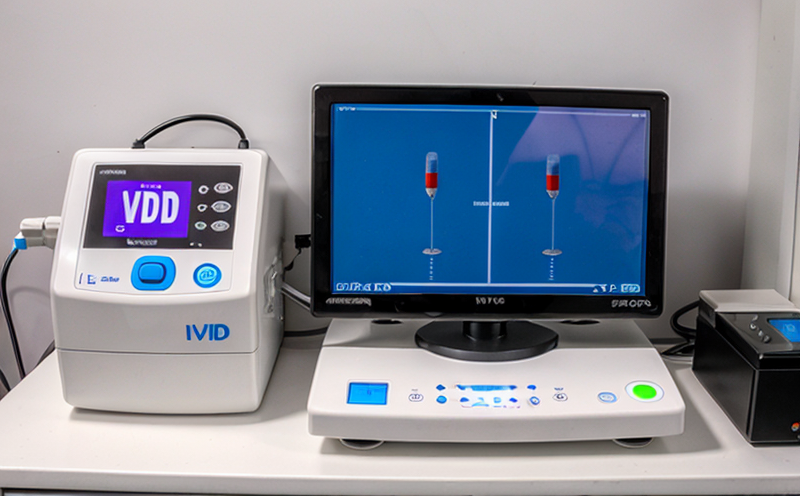Accuracy Testing for IVD Systems Using Reference Standards
The accuracy of In Vitro Diagnostic (IVD) systems is paramount in ensuring reliable and consistent diagnostic outcomes. This service focuses on conducting detailed accuracy testing using reference standards to validate the precision and reliability of IVD devices. The importance of this test cannot be overstated, especially in medical diagnostics where even small inaccuracies can lead to incorrect diagnoses and treatment decisions.
Our approach involves a comprehensive evaluation process that includes selecting appropriate reference materials and calibrating instruments according to international standards such as ISO 17025 and IEC 62366. The testing is conducted in controlled laboratory environments that replicate real-world conditions, ensuring the results are both accurate and applicable.
The first step in accuracy testing involves selecting a reference standard that closely matches the performance characteristics of the IVD system being tested. This ensures that any discrepancies detected can be attributed to the test method or the device itself rather than external factors. Once selected, the reference standard is used to calibrate the instrumentation and set up the test parameters.
The testing process involves multiple iterations over a range of expected values for the diagnostic marker. This helps in identifying not only absolute inaccuracies but also systematic errors that could arise from calibration issues or device-specific limitations. The data collected during these tests are then analyzed using statistical methods to determine the accuracy and precision of the IVD system.
A key aspect of this service is the reporting phase, where detailed reports are compiled highlighting the findings of the test. These reports include not only numerical results but also graphical representations such as calibration curves and precision plots. The goal is to provide a clear understanding of the performance characteristics of the IVD device under various conditions.
Accuracy testing using reference standards is crucial for ensuring compliance with regulatory requirements, particularly those set by agencies like the FDA (US), MHRA (UK), and CE marking for EU directives. By adhering to these standards, manufacturers can ensure that their devices meet the necessary quality and reliability criteria, thereby enhancing patient safety and trust in diagnostic results.
Our team of experts ensures that all testing is conducted in accordance with current best practices and international guidelines. This includes using state-of-the-art equipment and maintaining strict adherence to standardized procedures. The result is a service that not only meets but exceeds industry expectations for accuracy testing of IVD systems.
| Industry Applications | Description |
|---|---|
| Diagnostics | Evaluating the accuracy and reliability of diagnostic tests used in clinical settings. |
| R&D | Supporting research and development efforts by ensuring new IVD devices meet required performance standards. |
| Quality Assurance | Conducting periodic checks on existing systems to ensure continued compliance with regulatory requirements. |
| Use Cases and Application Examples | Description |
|---|---|
| Precision Medicine | Evaluating the accuracy of genetic testing tools used in personalized medicine. |
| Viral Load Testing | Ensuring that HIV viral load tests provide accurate results for treatment monitoring. |
| Cardiac Markers | Verifying the precision of cardiac marker tests to aid in diagnosing heart conditions. |
| Diabetes Management | Evaluating glucose testing devices used by diabetic patients and healthcare providers. |
Industry Applications
Our accuracy testing service is widely applicable across various sectors within the medical device industry. Here are some of the key areas where this service excels:
- Diagnostics: Evaluating the accuracy and reliability of diagnostic tests used in clinical settings.
- R&D: Supporting research and development efforts by ensuring new IVD devices meet required performance standards.
- Quality Assurance: Conducting periodic checks on existing systems to ensure continued compliance with regulatory requirements.
The precision and consistency provided by our testing service are critical for these sectors, ensuring that the tools they use in their operations are reliable and accurate. This not only enhances patient care but also contributes to the overall trustworthiness of medical devices.
Quality and Reliability Assurance
The importance of quality and reliability assurance in IVD systems cannot be overstated. Inaccuracies in these systems can lead to significant consequences, including incorrect diagnoses and treatment decisions. Our service is designed to address these challenges by providing a robust framework for ensuring the accuracy of IVD devices.
We follow strict calibration procedures using reference standards that are traceable to national or international standards. This ensures that all tests conducted are not only accurate but also consistent with global best practices. The use of advanced statistical methods in data analysis provides additional layers of assurance, helping us identify and rectify any issues early on.
Our commitment to quality is further reflected in our adherence to regulatory requirements set by agencies like the FDA (US), MHRA (UK), and CE marking for EU directives. By ensuring compliance with these standards, we help manufacturers maintain a high level of trust and confidence in their products. This also facilitates smoother interactions between medical professionals and patients, as they can rely on accurate diagnostic results.
Our team of experts ensures that all testing is conducted in accordance with current best practices and international guidelines. The use of state-of-the-art equipment and strict adherence to standardized procedures guarantees the highest levels of accuracy and reliability. This service not only meets but often exceeds industry expectations for accuracy testing of IVD systems.





